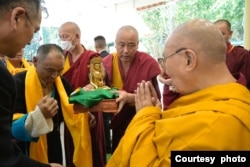Former U.S. House of Representatives Speaker Nancy Pelosi and other U.S. lawmakers met with the Dalai Lama at his home in Dharamshala, India, on June 19, advancing calls for the Tibetan people’s self-determination.
President Joe Biden intends to sign into law the Resolve Tibet Act that the U.S. House passed on June 12.
The bill calls for the dispute between China and Tibet “to be resolved in accordance with international law.”
China falsely maintains it peacefully liberated Tibet after invading it in 1950 then annexing it the following year.
Beijing condemned the congressional visit with the Dalai Lama and accused the United States of meddling in its “internal affairs.” China urged the U.S. to cease contact with Tibet’s spiritual leader. The Dalai Lama was the head of government and head of state but fled Tibet in 1959 after the failed Tibetan uprising that year.
The U.S. Resolve Tibet Act accuses China of “suppressing the ability of the Tibetan people to preserve their religion, culture, language, history, way of life, and environment.”
China’s state-sponsored Global Times newspaper challenged that, referencing the United States’ atrocities committed against Native Americans, while denying abuses are being committed against Tibetans.
“Tibetan culture and religious activities are protected and respected,” Global Times wrote.
That is false.
The reports from United Nations experts, human rights organizations, and reliable news media back up the assessment that Beijing “continues to erase Tibetan religion, culture, and language,” made by U.S. Representative Jim McGovern, a Democrat from Massachusetts, who helped introduce the bill.
The International Tibet Network, a global coalition of Tibet-related nongovernmental organizations, described Tibet as “China’s laboratory for repression,” where Beijing hones its policies of social control, mass surveillance, and cultural and religious suppression.
China uses a “grid-style social management” system that extensively expanded policing and surveillance, including within monasteries, after its introduction in 2011.
Chen Quanguo, who introduced the societal control system in Tibet while serving as Tibet’s CCP party secretary, in 2016 became party secretary of the Xinjiang Uyghur Autonomous Region.
There, Uyghurs and other ethnic and religious minorities face mass internment, torture, religious repression, forced labor and state-backed sterilization.
Amnesty International says that Tibetan Buddhists, like other religious minorities in China, have been “oppressed or imprisoned for practicing their religious beliefs.”
In April 2023, U.N. experts said China subjected hundreds of thousands of Tibetans to “labor transfer” and “vocational training” programs, where they are “reportedly prevented from using the Tibetan minority language and discouraged from expressing their religious identity,” under the pretext of poverty elimination.
In February 2023, U.N. experts found that the Chinese authorities had placed 1 million Tibetan children in residential schools. The “Chinese government policies aimed at assimilating Tibetan people culturally, religiously and linguistically” involved separating the children from their parents.
The policies of forced assimilation exhibited at the schools and elsewhere in Tibet “run contrary to the prohibition of discrimination and the rights to education, linguistic and cultural rights, freedom of religion or belief and other minority rights of the Tibetan people,” the U.N. experts said.
In December 2022, the U.S. Treasury sanctioned Chinese officials in Tibet for “arbitrary detention, extrajudicial killings, and physical abuse” against Tibetans as part of China’s “efforts to severely restrict religious freedoms.”
The Harvard International Review said that while “Tibetan Buddhists pose no immediate threat to the Chinese government’s prerogatives in Tibet,” Beijing views their religion as a substantial enough threat “to warrant continued anti-Buddhist activity.”
China pushes Tibetans to denounce the Dalai Lama, who remains popular among Tibetans, to encourage loyalty to the state.
Chinese authorities subject Tibetans to arrest, torture and/or imprisonment for displaying images of the Dalai Lama, burning incense or praying for him.
Polygraph.info has compiled related abuses here.



